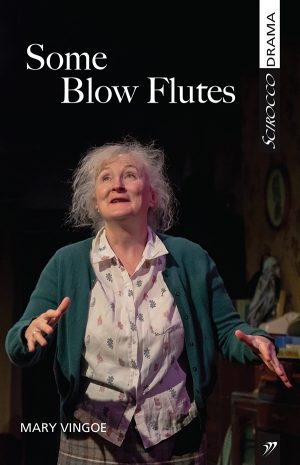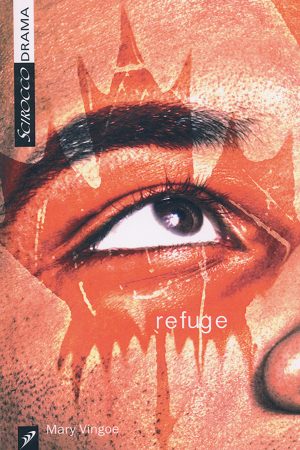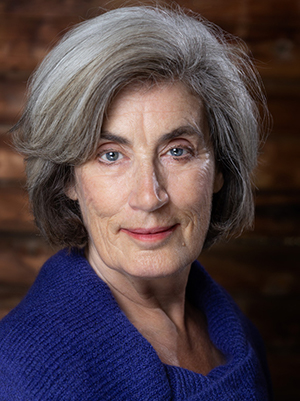Posted March 2, 2023
The Interview – Mary Vingoe
Mary Vingoe
Mary Vingoe is a director, artistic director, festival director, playwright, teacher, and actor who has worked at theatres across the country. Vingoe is celebrated for co-founding four major theatre companies in Canada: Toronto’s Nightwood Theatre, Ship’s Company Theatre in Parrsboro, NS, The Eastern Front Theatre in Halifax and the Magnetic North Theatre Festival at Canada’s National Arts Centre. Vingoe’s plays include Living Curiosities, Refuge, which was short-listed for the 2016 Governor General’s Award for Drama, and Some Blow Flutes, which was nominated for best new play at the 2019 Nova Scotia Merritt Awards. In 2011, Vingoe was made an Officer of the Order of Canada for her contributions to Canadian theatre.
Mary, you have an incredible career as a director, actor, dramaturge, and producer. You’ve also written several plays, including Scirocco Drama publications Some Blow Flutes, a moving drama about two families in crisis whose lives intersect, and Refuge, a powerful examination of the difficulties facing refugees seeking asylum. How does your extensive experience as a director inform your playwriting?
I would say I’m never far from the rehearsal hall when I’m writing. I think about staging possibilities and actors I know who could do the part. It’s a blessing and a curse.
You’ve worked all across the country, but you’re based in Halifax. What keeps you in Nova Scotia? What do you love about the theatre scene where you are?
I have been fortunate to work across Canada, but Nova Scotia is home. I lived in Toronto for thirteen years. I did a Masters at U of T Graduate Centre for the Study of Drama and then went on to be an actor at Theatre Passe Muraille with Nightwood, Theatre Direct school touring and even a season at the Shaw Festival before writing and directing became more interesting to me. I realized I loved the rehearsal hall more than the performance. I stay in Nova Scotia because I feel I belong here. I have watched it grow and change over 40 years.
My husband Paul Cram was from Vancouver. We met in Toronto and were there a few years before sky-high house prices and starting a family made us reconsider. I wanted to have the baby at home in Nova Scotia and I wanted to be closer to my mother, who was widowed. So, we agreed to try it for a year. The baby was born, we reconnected with folks here. Paul started Upstream Music with some jazz buddies and I joined forces with Wendy Lill and Gay Hauser to start The Eastern Front Theatre, here in Dartmouth. Our second daughter was born. It felt like we were home. So, we stayed.
Among the most remarkable of your achievements is the fact that you have founded or co-founded at least five successful theatres/theatre festivals in Canada, including Nightwood Theatre, Ship’s Company Theatre, Eastern Front Theatre, HomeFirst Theatre, and Magnetic North Theatre Festival! What characteristics, if any, do they share? Can you tell us a bit about the challenges of founding a theatre company?
Starting a theatre company is an act of faith. No matter how well you plan, your plans will mostly go awry. In my experience, you need to believe in something bigger than yourself. At Nightwood we were trying to make space for women artists directors and playwrights who were virtually invisible on Toronto and Canadian stages. At Ship’s Company, located in an old ferry vessel beached at Parrsboro NS, we were developing stories from our own region giving voice to Atlantic Canadian playwrights. At Eastern Front the mandate was similar but this time the audience was urban, and the plays began to be more diverse. In 2002, I was asked to become the AD of The Magnetic North Theatre Festival. It was the most ambitious and challenging thing I had ever done. Bringing the country together in a different city every second year. My GM Barbara Howatt and I were managing three seasons, wrapping past in one city, planning future in another and performing in a third. I truly believe we changed Canadian theatre, introducing theatre artists and their work to artists from all parts of the country. I remember introducing the brilliant Indigenous playwright Marie Clements to Newfoundland comedy legend Andy Jones at the first press conference in Ottawa. They had never met. It was electric. That was true for most theatre artists in Canada. Magnetic North began to change all that. I still regret its demise.
Refuge was a finalist for the NS Masterworks Award, the Merritt Award for Best New Play, and the Governor General’s Literary Award for Drama, and you were named an Officer of the Order of Canada in 2010. What have these official recognitions of your contribution to arts and letters meant to you?
It was thrilling to have Refuge nominated for the GG. It gave the play a much higher profile and contributed to its success in productions across the country. The Order of Canada is certainly in a class by itself. I mean when they phoned, at first I thought it was a joke, Officer of the Order of Canada. It took a while to sink in, but I think they were rewarding the national scope of Magnetic North and celebrating the importance of Canadian theatre. I am incredibly grateful for that. It’s not something that comes up every day but it’s on those days when I need a little boost, “Hey, I got the Order of Canada, I must have done something right,” can sometimes be helpful.
Some Blow Flutes features a character with dementia, a condition that has touched the lives of many people. Why did you want to explore this particular subject?
My husband Paul was struck down with early onset Alzheimers. I was his principal caregiver for five long years before he passed away. He was home with me until the last six months when I could no longer care for him and he had to go into care. So, I know that terrible journey well. I also know that people afflicted with this disease are still hugely complex human beings and that truth can sometimes come out in surprising ways. It was a play I had to write.
What advice would you give to aspiring playwrights?
Go to theatre, any kind of theatre and then maybe when you know a little more you can start a theatre company to produce your work. Raid your local library or bookstore and read plays, try to imagine what they look and feel like staged. Write, write, write and submit your work wherever you can. Eventually you will find the right fit.
-
 Some Blow Flutes$9.99 – $15.95
Some Blow Flutes$9.99 – $15.95 -
 Refuge$9.99 – $15.95
Refuge$9.99 – $15.95

